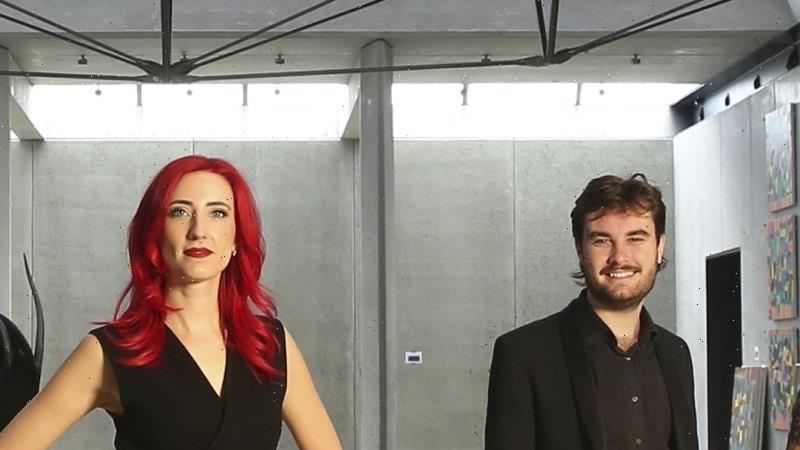
Modern ‘cathedral’ opens its doors with music fit to wake the dead
10/12/2022Giuseppe Verdi’s monumental Messa da Requiem was first performed in 1874 under the soaring ceiling of the church of San Marco in Milan.
The contrast between that 13th-century setting and the futuristic venue for a performance later this month of the Italian master’s colossal work couldn’t be starker, yet at the same time there are some striking similarities.
Art collector and philanthropist Judith Neilson’s art storage facility, Dangrove, in inner-city Alexandria, has often been called a modern “cathedral”. Its focal point is the towering 10,000sqm Great Hall and it is there that young orchestra Ensemble Apex will join Sydney Philharmonia Choirs’ VOX and four soloists to present the Requiem.
Beau Neilson (centre) with Sam Weller (left) and some of the musicians who will be performing at Dangrove.Credit:James Alcock
And, similar to its counterpart in Milan, the Great Hall has an ear-boggling seven-second reverb, which 24-year-old conductor Sam Weller is looking forward to tackling when the 150 performers assemble for the first dress rehearsal.
“It was written for a space with a big reverb,” he says. “We’ll definitely lay into that. It’s sort of putting on the Verdi as though it could have been premiered today.”
Philanthropist Judith Neilson.Credit:Janie Barrett
The two concerts are presented by Phoenix Central Park, the revolutionary performing arts venue at Chippendale, and curated by Neilson’s daughter Beau Neilson, Executive Producer and Creative Director at Phoenix. There have been a few smaller concerts at Dangrove but this, says Beau Neilson, is “by far” the most ambitious work presented there.
“This is a really special occasion to have the general public in the space to hear such beautiful music.”
One of the quirks – and strengths – of the two-year-old Phoenix project is that it is run on a philanthropic basis. The free tickets can be obtained only by ballot.
“We’re in a fabulous position to be able to push boundaries and work with artists we want to work with and that we really value,” Neilson says.
And that unusual model also means the focus can be squarely on the performance not on, say, generating revenue from food or booze.
“It puts the audience in a different mindset,” Neilson says. “They come into the space and there are no distractions of tinkling bottles and people shouting their orders. You have this moment of focus and presence that is I think often missed in contemporary music particularly.”
Part of Neilson’s mission is to introduce audience members to different styles beyond their usual musical diet.
“People tend to silo their musical taste and don’t appreciate how fabulous it all is,” she says. “Once they have that exposure they’re like, ‘Wow, I didn’t realise – I love this!’”
It’s a sentiment shared by Ensemble Apex founder Weller. He set up the ensemble in 2016 “basically as a means for me to learn how to conduct” and since then it has developed into a professional orchestra with players, mostly under the age of 30, drawn from around the country.
“My big passion is bringing orchestral music to audiences who would not normally think to go and see orchestral music,” he says. “There’s a very common trope of orchestral music being stuffy and elitist but we just say that and then we don’t do much about it.
“What we try to do in every project we do and why we feel so privileged to be working with Phoenix on this is to create some genuine change in how people perceive what an orchestra is.”
A central plank to changing that perception is preparing audiences in advance for the concert experience.
“It’s really thinking about how you talk to the audience, how you deliver program material beforehand – basically changing the way orchestral music is packaged,” says Weller. “Because it’s not the repertoire that people are scared of. There have been countless surveys on all different repertoire and people still have a genuine reaction to the music, whatever it is.”
And another plank is performing in venues other than traditional concert halls. In the past, Ensemble Apex have performed at the Powerhouse Museum, the Metro Theatre and in the basement of Sydney Town Hall.
“When orchestras are outside of the concert hall, people are perhaps more willing to go see what is happening,” Weller says.
Weller admits there have been some raised eyebrows over his choice of the Requiem for his young orchestra. It’s a famously massive work originally scored for orchestra, double choir and four soloists.
But, he says, it holds no fear for him and is very “on brand” for Ensemble Apex, who in the past have performed diverse works including Wagner’s Sigfried Idyll, an oboe concerto by Czech composer Bohuslav Martinů and, with Sydney Dance Company, Bela Bartok’s The Miraculous Mandarin.
“The Verdi Requiem is a statement for the orchestra,” he says. “It’s a statement for Phoenix and it’s really beautiful. I’m really excited about it.”
Ensemble Apex will perform at Dangrove on October 27 and 28. Details and how to enter the ballot are here.
A cultural guide to going out and loving your city. Sign up to our Culture Fix newsletter here.
Most Viewed in Culture
From our partners
Source: Read Full Article



